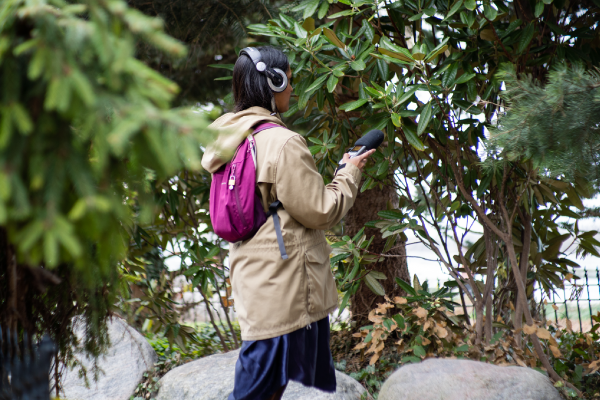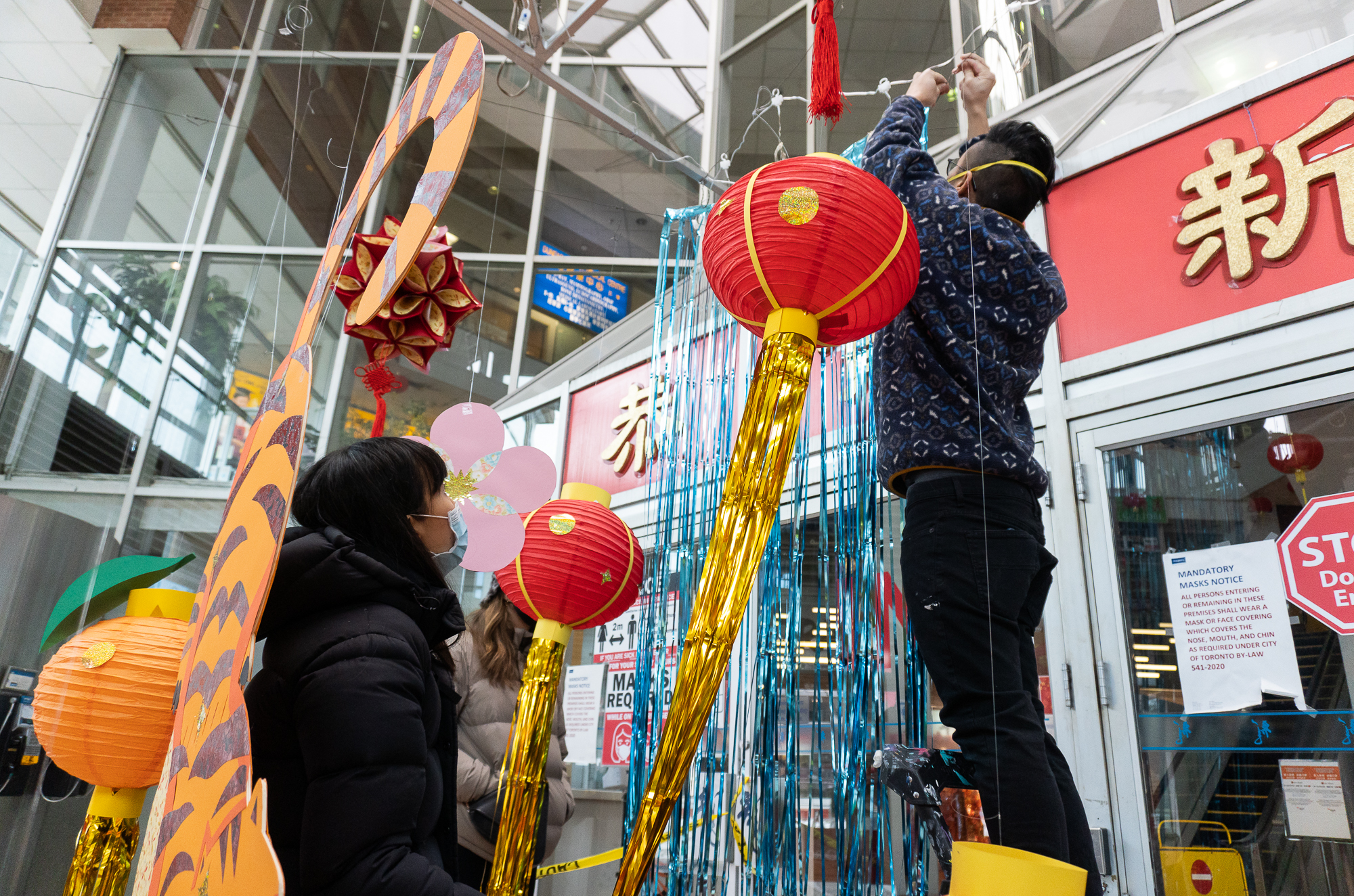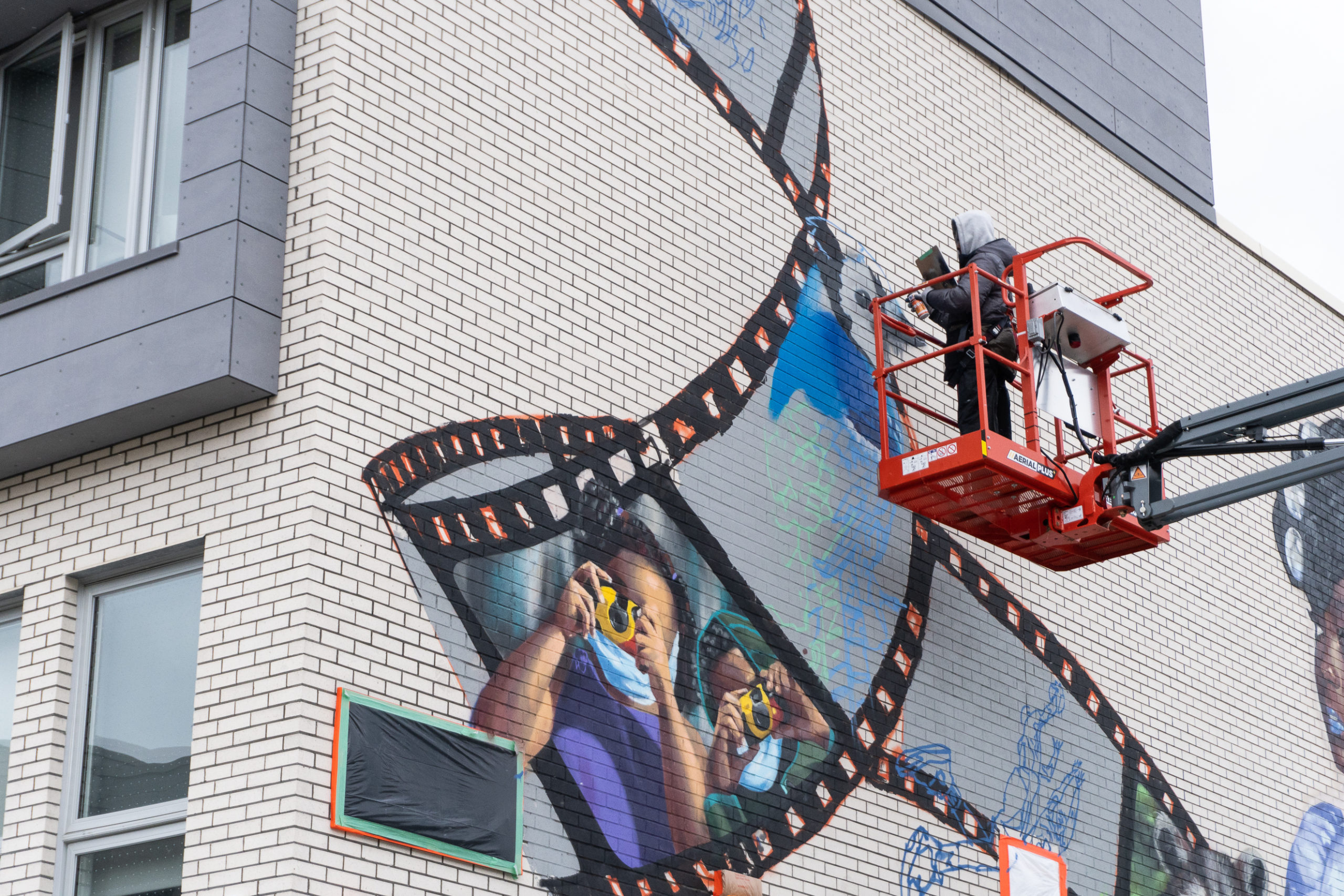Public art and community resources
STEPS joins with others across our world in the condemnation of all forms of racist violence against Black, Brown, Indigenous and People of Colour.
As an organization committed to supporting communities to activate public space by leveraging the power of arts to raise awareness about inequities in our cities, we must become better allies. This begins with examining our own blindspots and privilege as an organization that operates on stolen land in Tkaronto.
The following is a collection of public art opportunities and resources that we feel may be valuable to our communities. Many have been created by colleagues, while others have been developed or shared by people around the world. This is by no means intended to be an exhaustive list. We encourage you to share resources that you have found valuable with our team.
STEPS reaffirms our commitment to amplifying the work of Indigenous, Black, newcomer, LGBTQQIP2SAA+, disabled and artists of colour working across the region that is currently Canada. We will continue to expand the ways we support equity-seeking artists through targeted residencies and equitably paid opportunities. We will continue to facilitate participatory arts programming in some of Canada’s most diverse communities and provide a platform for people to share their vision for our cities. Furthermore, we will continue to listen, learn, and identify ways we can actively address and dismantle racist and exclusionary systems through our work.
We acknowledge that there is so much more we can do, and we welcome feedback on where we can do better. We encourage individuals to learn more about racism in Canada, and ways in which they can take action through allyship, beginning with some of the following resources, which members of our team have found helpful in our own learning.
Research from STEPS
Public art and placemaking resources
- Design Census by AIGA Eye on Design
- Placemaking: What if We Built Our Cities Around Places (PDF) by Project for Public Spaces
- Reappearance of the Public: Placemaking, Minoritization and Resistance in Detroit by Alesia Montgomery (Research Publication), International Journal of Urban and Regional Research
- Placemaking Toolkit by My Main Street Community Activator
- Innovation and Resilience in the Arts, Culture and Heritage, Research Key Takeaways by Hill Strategies
- Guidelines for safe, happy and fun park programming during COVID-19 by Park People
- COVID-10 and Parks: Highlights from our National Surveys by Park People
- Indigenous City Building: Signature Projects in Canadian Cities (Video) by ULI Canada
- Indigenous Protocols for the Visual Arts by CARFAC
- The Field Guide for Parks and Creative Placemaking by City Parks Alliance
- Success Measures Creative Community Development Evaluation Tools (PDF) by NeighborWorks America
- EnAbling Change: Community Collaborations (Video) by Orchestras Canada (French available)
- Rural America Placemaking Toolkit by Rural Placemaking
- ArtUp: RFQ How-To (Video) by Jen Krava and Aki Shabata, Forecast Public Art
- Tools and Approaches for Arts and Culture Planning Grounded in Practices, Place and People, Arts & Planning
- Arts and Equity Toolkit by Neighbourhood Arts Network
- Creating Competitive Advantage to Broaden, Deepen and Diversify Participation in the Arts by Gerald D. Yoshitomi, Meaning Matters
- Index of Community Engagement Techniques (PDF) by Tamarack Institute
- Public Art Toolkits by Creative City Network of Canada
- Transforming Communities through the Arts by Toronto Arts Foundation, Art Starts, OCAD University and York University
- Bringing the City Alive: Impact of the Arts by Toronto Arts Foundation and Leger
- The Art of Resilience, The Resilience of Art (PDF) by Breuninger Foundation, Musagetes, and the J. W. McConnell Family Foundation
- Framing Community: A Community Engaged Art Workbook (PDF) by Ontario Arts Council
- A Guide to Engaging the Community in Your Project by Artscape DIY
- Culturing Sustainability: A Cookbook for Artists and Educators (PDF) by Caffyn Kelley, Athabasca University
- The 2022 Canadian City Parks Report: Nurturing Relationships and Reciprocity by Park People
- Community Arts and Digital Practice During COVID-19 Report by Toronto community arts organizations and Nordicity
- Cool It With Art: A How-To Guide for Tackling Rising Temperatures with Art in our Communities (PDF), Metropolitan Area Planning Council
- How Can Public Art Empower Communities Panel Discussion (Video), ArtBridge
- Canada’s Arts and Learning Communities Online Resources, The Canadian Network for Arts & Learning
- The Economic Impact of Arts and Culture Tourism, Ontario Arts Council
- Public Arts Equity in Action (Video), Culture Days
- Understanding the Role of Privately Owned Public Spaces (POPS), Park People
Supports for artists
- Canadian Artists’ Representation/Le Front des artistes canadiens (CARFAC) for representation of visual and media artists and establishment of standards and equitable fee scales
- Ontario Artists’ Legal Access and Support Network by CARFAC Ontario
- Tax Tips for Artists by CARFAC
- Image File Formats: When to Use Each File Type by Samual Lundquist, 99designs
- Image Size and Resolution Explained for Print and Onscreen by Helen Bradley, Digital Photography School
- What is Bleed? by Service Printers
- Image Size and Resolution by Adobe
- Understanding DPI and Pixel Dimensions (PDF) by iPrintfromHome
- Understanding DPI, Resolution and Print vs. Web Images by Scott Ellis, VSELLIS
- Tookit: Caring for Yourself is a Radical Act: Self-Care Guide for Youth Working in Community by ArtReach Toronto, YouthREX
- Mural Production Resources by Mural Routes
- How Much?! Demystifying Pricing for Murals Panel Discussion (Video) by OCAD University’s RBC Centre for Emerging Artists & Designers and Mural Routes
- Waging Culture Interrogating the Canadian Visual Artist Labour Force by Michael Maranda
- Emotional Labour and Burnout in Social Practice Artists Forum Recordings by Social Art Network
- Know Your Rights by CARFAC
- Art Works Abroad, Exhibiting and Traveling Outside of Canada by CARFAC
- Taking Artwork Over the Border by CARFAC
- Six Paths to Support Working Artists by The Artful Manager
- Artist Resouce Library by CARFAC
Supporting Indigenous communities
- Ten Ways to be a Genuine Ally to Indigenous Communities by Amnesty International
- Anishnawbe Health Toronto
- Anishnawbek News
- Aboriginal Peoples Television Network (APTN)
- Truth and Reconciliation Report and Recommendations in libraries and archives by Canadian Federation of Library Associations/Féderation canadienne des associations de bibliothèques
- CBC Indigenous News
- Decolonization is Not a Metaphor (PDF) by Eve Tuck and K. Wayne Yang, Decolonization: Indigeneity, Education & Society
- Mental Health and Wellness Support by First Nations Health Authority
- Gord Downie & Chanie Wenjack Fund
- Indian Residential School Survivors Society Counselling Services
- Ontario Federation of Indigenous Friendship Centres
- From Reconciliation to Reciprocity (Video) with Kenn Richard and Lindsay (Swooping Hawk) Kretschmer, Toronto Foundation
- Native Child and Family Services of Toronto
- Indigenous Spirit Fund
- Non-Indigenous people – here’s what you can do, right now by Anna McKenzie, IndigiNews
- Indspire
- Legacy of Hope Foundation
- Settlers Take Action, A List of Resources by On Canada Project
- Truth and Reconciliation Commission Reports and its 94 Calls to Action by National Centre for Truth and Reconciliation
- Reclaiming Power and Place Report by National Inquiry into Missing and Murdered Indigenous Women and Girls
- Find out whose traditional territory you live on through Native Land
- Native Women’s Association of Canada
- Reconciliation Canada
- Tkaronto Indigenous Peoples Portal
- Toronto Aboriginal Research Project Final Report (PDF) by Toronto Aboriginal Support Services Council (TASSC)
- Beyond thoughts and prayers: Actions you can take to support residential school survivors in Canada by Danica Samuel, Toronto Star
- Indigenous Canada Course (Free), University of Alberta Faculty of Native Studies
- A Knock on the Door: The Essential History of Residential Schools from the Truth and Reconciliation Commission of Canada by The Truth and Reconciliation Commission of Canada, University of Manitoba Press
- Woodland Cultural Centre
- Calls to Action Accountability: A 2021 Status Update on Reconciliation by Yellowhead Institute
- 15 Point Guide: Standards of Achievement for the Relationship Between Indigenous Peoples & Cultural Institutions in Canada (PDF) by Lindsay Nixon, Yellowhead Institute Special Report
- A Culture of Exploitations: “Reconciliation” and the Institutions of Canadian Art (PDF) by Lindsay Nixon, Yellowhead Institute Special Report
- Indigenous Ally Toolkit (PDF) by Montreal Urban Aboriginal Community Strategy Network
- Elder Protocol and Guidelines (PDF) by Council on Aboriginal Initiatives, University of Alberta
- Healing and Decolonizing: Bridging Our Communities Toolkit, The Legacy of Hope Foundation
- Community Action Toolkit for Individuals, Communities and Organizations, Reconciliation Canada, Ontario Nonprofit Network
- Reconciliation Dialogue Workshop Discussion Guide, Reconciliation Canada, Ontario Nonprofit Network
- How Nonprofits Can Better Ally with Indigenous Organizations, Charity Village
- Moved to Action: Activating United Nations Declaration on the Rights of Indigenous Peoples (UNDRIP) in Canadian Museums, Canadian Museums Association
Supporting the Black community
- A Different Booklist
- ByBlacks Business Directory by ByBlacks
- Canadian Black Hosts, Moderators and Speakers List (Google Excel) by Nana aba Duncan
- Loveland Therapy Fund by the Loveland Foundation
- The Great Unlearn Patreon by Rachel Cargle
- Black Women Connect Vancouver
- Yo, Is This Racist? (Podcast) by Andrew Ti and Tawny Newsome
- 7 Ways Non-Black People of Color Perpetuate Anti-Blackness by Palmira Muniz, The Body is Not an Apology
- AROBA: A Room of Black Artists (Podcast) by Lana Lovell
- Nia Centre for the Arts
- The Pervasive Reality of Anti-Black Racism in Canada, CivicAction, Ontario Nonprofit Network
- Resources on Black Youth Mental Health, YouthREX
- Black History Month Playlist (Videos), Toronto History Museums
Further allyship and other resources
- Resources for Photographers and Beyond on Anti-Racism (Google Doc) by Authority Collective
- Justice in June by Autumn Gupta
- Bakau Consulting (workshops, training programs, and resources for equity, justice and anti-racism)
- Black Lives Matter Ways You Can Help
- Canadian Mental Health Association
- A Call to Courage, An Open Letter to Canadian Urbanists by Jay Pitter (PDF), Canadian Urban Institute
- Toronto for All: Confronting Anti-Black Racism Initiative Community Conversation Guide (PDF) by City of Toronto
- Design Thinking is a Rebrand for White Supremacy by Darin Buzon, Medium
- Future Ancestors Services (workshops and training to advance climate justice addressing systemic issues through the lenses of anti-racism and ancestral accountability)
- How to be Actively Anti-Racist by Good Good Good
- 106 Things White People Can Do for Racial Justice by Corinne Shutack, Medium
- 10 Steps to Non-Optical Allyship by Mireille Cassandra Harper
- Our Book Bag (Children’s Booklist)
- LGBTQ2+ Workplace Inclusion Training, Pride at Work
- How to be an Ally: Islamophobia at the Intersections (PDF)
- Black Lives Matter is Not a Design Challenge by Schessa Garbutt, Medium
- Calling People in About “Violence” by Showing Up for Racial Justice (Google Doc)
- How to Think Differently About Doing Good as a Creative Person by Omayeli Arenyeka, The Creative Independent
- Black Lives Matter: A Booklist, Toronto Public Library
- Read Indigenous Booklist, Toronto Public Library
- Racism Exists in Canada, Toronto Star
- Booklist about Racism, TYPE Books
- What it Takes to be Racially Literate (Video) by Priya Vulchi and Winona Guo, TED Talk
- The Urgency of Intersectionality (Video) by Kimberlé Crenshaw, TED Talk
- Why I’m Nonbinary but Don’t Use They/Them by Hunter Ashleigh Shackelford
- Asking About Gender: A Toolkit for Youth Workers by YouthREX and LGBT YouthLine
- The Micropedia of Microaggressions by individuals and community organizations, including Black Business and Professional Association, Canadian Congress of Inclusive Diversity and Workplace Equity, Ted Rogers School of Management (Diversity Institute), and Pride at Work Canada
- AI, Ain’t I A Woman? (Video) by Joy Buolamwini
- 50 Cognitive Biases in the Modern World
- Uncovering Belonging (Podcast) by Pride at Work
- Tips for Employers: Building an Inclusive Workplace (PDF), David C. Onley Initiative for Employment & Enterprise Development
- One Word: Passing, Trans individuals were invited to respond to the word “passing” (Video), Cut
- What It’s Like to be Intersex (Video), As/Is
- Talking Consent by Sophie Jean, Briarpatch Magazine
- The Nonperformativity of Antiracism (PDF) by Sara Ahmed, Duke University Press
- Disability Pride Resources by YouthREX
- How Decent Work Practices Can Support 2SLGBTQI+ Staff in the Nonprofit Sector, Ontario Nonprofit Network
- 16 Unconscious Bias Examples and How to Avoid Them in the Workplace, Built In
Accessibility resources
- Vital Practices in the Arts by Bodies in Translation: Activist Art, Technology, and Access to Life (BIT), Tangled Art + Disability and Creative Users Project (Google Doc)
- Tangled Arts + Disability
- Free Accessibility for Ontarians with Disabilities Act (AODA) Training
- Arts AccessAbility Network Manitoba
- Why Accessibility? An Introduction to the AODA and Disability Justice (Video) by Constance Exley (CEO, Accessibility Services Canada) and Sarah Jama (Executive Director, Disability Justice Network of Ontario)
- The Integrated Accessibility Standards Regulation Checklist (PDF), Accessibility for Ontarians with Disabilities Act (AODA)
- Tips for Employers: Understanding Disability (PDF), David C. Onley Initiative for Employment & Enterprise Development
- Tips for Employers: Language and Disability (PDF), David C. Onley Initiative for Employment & Enterprise Development
- Employers Guide to Hiring and Working with Professionals with Disabilities (PDF), David C. Onley Initiative for Employment & Enterprise Development
- Integrated Accessibility Standards Regulation: A Training Booklet for Small Private and Not-for-Profit Organizations (PDF), AccessForward/Vers l’accessibilité
- Employers’ Toolkit: Making Ontario Workplaces Accessible to People with Disabilities, 2nd Edition (PDF), The Conference Board of Canada
- Building Disability Etiquette into the Workplace (PDF), David C. Onley Initiative for Employment & Enterprise Development
- Tips for Service Providers Communicating with Students about Workplace Accommodations (PDF), David C. Onley Initiative for Employment & Enterprise Development
- Tips About Disclosure (PDF), David C. Onley Initiative for Employment & Enterprise Development
- Support for Employers: Why Hire People with Disabilities? (PDF), Kootenay Career Development Society
- 10 Minute Training: Website Accessibility (Video), Smart Cause Digital
- Read Aloud: A Text to Speech Voice Reader
- Speechify: Text to Speech Reader
- Autism and Neurodiversity in the Workplace, Free Self-Paced Online Program by the University of British Columbia
- Accessibility Services Canada
- Accessibility Toolkit, Tangled Art + Disability
- EnAbling Change: Accessibility for Performing Arts (PDF) by Kristina McMullin
- Crip Times Podcast, Bodies in Translation
- Cripping the Arts Access Guide (PDF), Tangled Art + Disability
- Cripping Masculinity
- Who Can Experience My Posts? An Accessibility Guide to Everyday Social Media (Video), Culture Days
- EnAbling Change: Accessibility for the Performing Arts (YouTube playlist), Orchestras Canada
- Creative Users Projects
- Theatre Passe Muraille Accessibility Labs
- Making a Living in Disability Arts Toolkit and Masterclass Teachings by Shay Erlich
- Accessibility in Creative Spaces: A Toolkit for Ontario Arts Organizations, (PDF), ARTSBUILD ONTARIO
- Ontario Ministry for Seniors and Accessibility Guide for accessible engagement, (PDF), Ontario Municipal Social Services Association
- Accessibility Toolkit: A guide to making art spaces accessible, (PDF), Tangled Art + Disability
- Access Toolkit: Making outdoor arts events accessible to all, (PDF), Independent Street Arts Network
- Institute for Human Centred Design: Universal Design Cheat Sheet, (PDF), IHCD
- 8 Things Everyone Needs to Know About Art and Disability, website, Canadian Art
- Building for Everyone – A Universal Design Approach: External Environment and Approach, (PDF), National Disability Authority
- Great Outdoors Access Guideline, (PDF), Irish Wheelchair Association
- Town Centre Living: 10 Principles of a Caring Place, (Website), Architecture & Design Scotland
- What is Universal Design?, (Website), The UD Project
- Inside Out – Accessibility, (Website), Inside Out
- Creating a Culture of Accessibility – A case study on how festival and event organizations can move from accessibility compliance to an accessibility culture., (PDF), Inside Out
- Re•Vision, (Website), The Centre for Art & Social Justice
- Navigating Main Streets as Places: A People-First Transportation Toolkit, (PDF), Project for Public Spaces
- “A Look at Public Art” by Ramiro Flores-Martinez, (Article), Johnson County Community College
- KickstART Disability Arts & Culture, (Website), KickstART
- CoMotion, (website), Harbourfront Centre
- EnAbling Change – Community Collaborators, (youtube video), Orchestras Canada
- Accessibility in the Arts: A Promise and a Practice, (website), Promise & Practice Art
- Reimagining Public Spaces: Accessible Public Spaces for All, (PDF), Future Cities Canada
- Tangled Art + Disability: Accessibility Tool Kit, (PDF), Tangled Art + Disability
- Tangled Art + Disability: Vital Practices in the Arts, (PDF), Tangled Art + Disability


